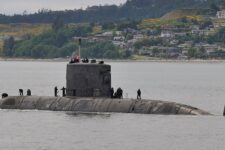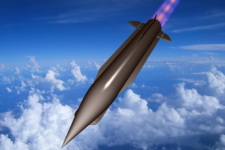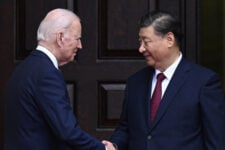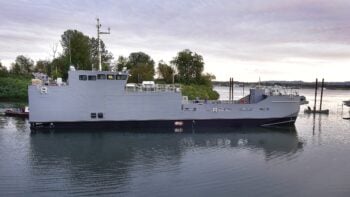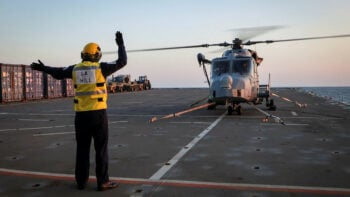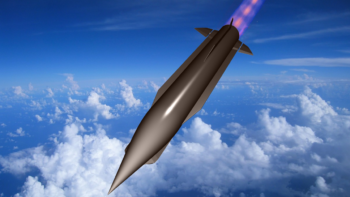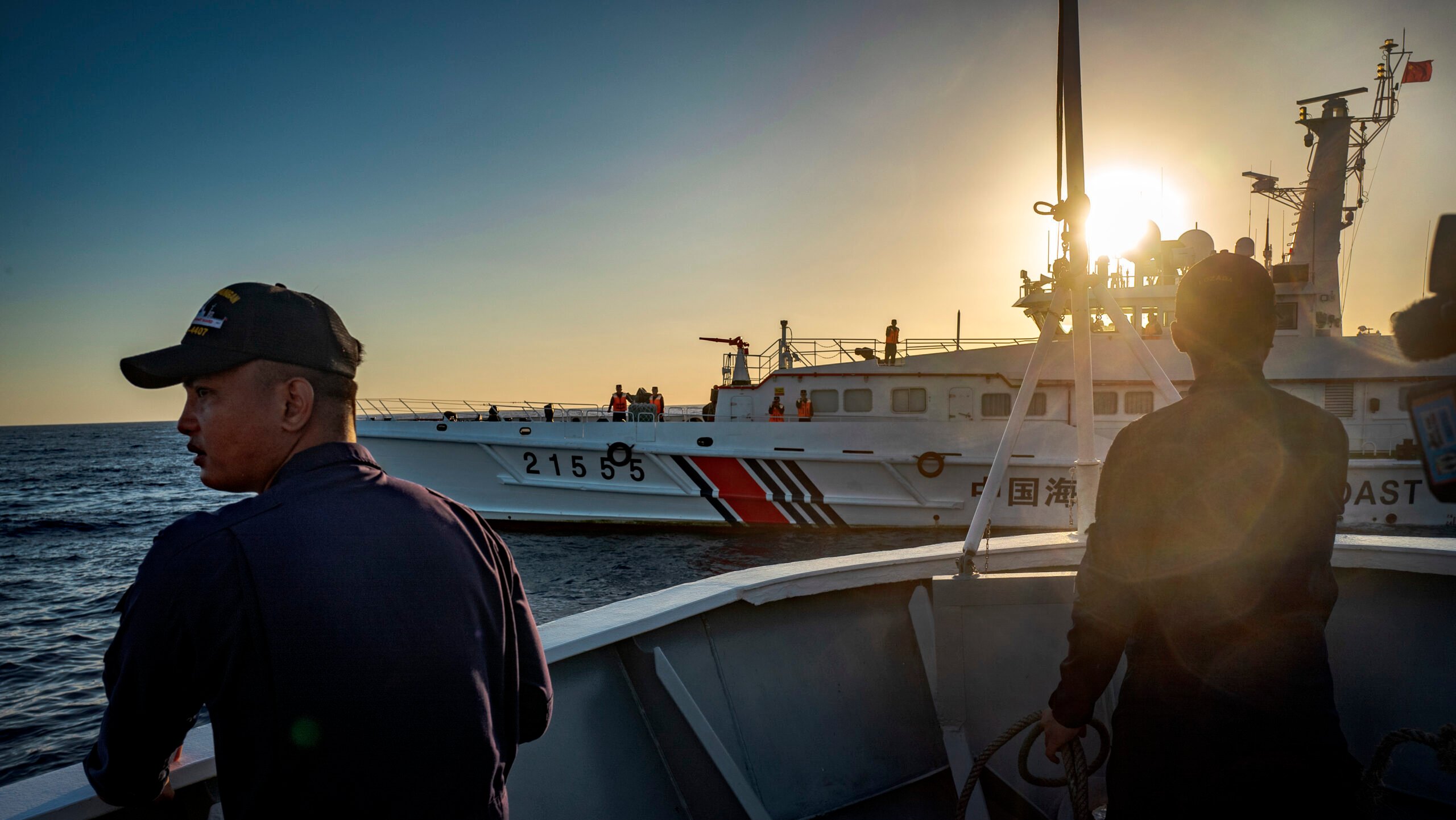
Philippine Coast Guard personnel aboard BRP Sindangan look on as a Chinese Coast Guard ship sails nearby, during resupply mission to troops stationed at Second Thomas Shoal, on March 05, 2024 in the South China Sea. (Photo by Ezra Acayan/Getty Images)
China has made the belief that it can operate with impunity in the waters of the Indo-Pacific region, much to the consternation of its neighbors. In this new op-ed, Lt. Cmdr. Thelmar Rosarda of the US Navy and Nathaniel Schochet of the Center for a New American Security argue that the US should use China’s maritime aggression to strengthen relations in the regions.
There is little doubt that China’s maritime power has grown over the last several decades, with its fleet expected to reach 400 surface combatants by 2025. As they have developed, however, so has their bullish infringement on recognized international law, as defined by the United Nations Convention on the Law of the Sea (UNCLOS). Put simply, Beijing has clear disregard for international cooperation in, on and around the water, not just in the Pacific but worldwide.
That’s a problem for countries who have to deal with it — but it represents an opportunity for the United States to strengthen its relationships with other nations as it seeks to build a geopolitical bloc against China’s expansionism. Some of this work is already underway: the recent trilateral summit that brought together Philippine President Ferdinand Marcos Jr., Japanese Prime Minister Fumio Kishida, and US President Joe Biden, as well as the Pentagon-led Balikatan exercises, are vital in promoting peace and stability, and are fundamental actions that promote and progress international norms, while strengthening US coalitions.
It’s a start, but not enough. The US should endeavor to build similar partnerships with countries who wish for stability throughout the region and to counter China’s gray zone activities. If China is going to be a bad neighbor, Washington should take every opportunity to remind countries in the region about it.
RELATED: Japan PM’s Washington trip: Bilateral focus but ‘groundbreaking’ trilateral goals
During the last two decades, China has sought to increase its capacity to operate in near and far water. These include a 150% increase in China’s People’s Liberation Army Navy (PLAN) ships, a 400% increase in China Coast Guard vessels, and a similar increase in its maritime militia. In July 2023, China and the Association of Southeast Asian Nations (ASEAN) agreed to work on a Code of Conduct in the South China Sea. Barely one month later, in August 2023, China’s Ministry of Natural Resources published a new claim that encompassed 90 percent of the maritime area—dubbed the “ten-dash line.” This new announcement continues the blatant disregard for international law, with China still in violation of the UNCLOS decision in 2016. Rightfully so, this new boundary was rejected by India, Indonesia, Vietnam, and several others.
China’s subsequent actions illustrate how they see their part in the maritime world — recognizing itself as a global power but unwilling to conform to international law. China’s sheer size can be daunting to nations with smaller fleets within the South China Sea, and its rampant gray zone activities risk escalation. In contrast, the United States has consistently shown not only adherence to customary international law but also as a willing partner in its enforcement — primarily through Freedom of Navigation Operations (FONOPS). Further, to enforce international law, the United States frequently conducts multi-lateral cooperation operations with partners and allies in the South China Sea.
Collaboration between partners who follow international law provides avenues to enforce the Law of the Sea together. As such, countries rejecting the new ten-dash line afford an opportunity for US partnerships.
One obvious example is the Philippines, which seemed to be moving away from America’s orbit in recent years only to come back thanks, in part, to China’s aggressive actions on the water.
The trilateral meeting last month provided an avenue to strengthen the partnership between the three allies and create an illustration of an international law-driven combined maritime force to lead in the South China Sea. As stated in the White House Joint Statement, “We underscore our nations’ unwavering commitment to freedom of navigation and overflight … as reflected in the 1982 United Nations Convention on the Law of the Sea (UNCLOS).”
As such, it was notable that Japan and the US signaled their commitment to assist in the modernization of the Philippines’ maritime capabilities. The US also announced that Japan and Philippine Coast Guard members would soon be welcomed aboard a US Coast Guard vessel during a patrol in the Indo-Pacific this year. The three countries also intend to conduct an at-sea trilateral exercise. Moreover, a trilateral maritime dialogue was announced with the aim of improving coordination and collective efforts in the region.
The leaders also recognized the importance of including other countries in the region in their pursuit of advancing maritime domain awareness. Accordingly, they publicized new efforts to strengthen maritime security through the Indo-Pacific Partnership for Maritime Domain Awareness (IPMDA)—announced two years ago by the Quad leaders. They also indicated a desire to conduct collaborative training programs with regional partners in Southeast Asia — expressing their intent to work in partnership with the Pacific Islands Forum (PIF) to support the 2050 Strategy for the Blue Pacific Continent.
Another sign of strengthened ties between the three countries: On April 22, 2024, the annual bilateral exercise between the Philippines and the US commenced, bringing together nearly 17,000 troops from the Philippines, the US, Australia, and France. The year’s exercise is notable for the numerous milestones achieved during it. For the first time, it will be held beyond the Philippines’ territorial waters and involve the Philippines Coast Guard (PCG)—highlighting the PCG’s role in countering Chinese grey zone activities. A component of the training will involve a “made in China” ship, a former BRP Lak Caliraya, used as a mock target during a sinking exercise off the Ilocos Norte coast.
RELATED: Philippines, Japan near long-range missile milestones as they arm up for China
Perhaps most alarming to China, the army will deploy the Mid-Range Capability missile (MRC), capable of hitting enemy targets in a range of 500- to 2,000- kilometers. The MRC has a vertical launch system and uses the Navy’s Raytheon-built Standard Missile-6 and Tomahawk Missiles. This will also be the first time France participates in the exercise, deploying the Floreal class frigate Vendemiaire
The Philippines is proving to be a good test case for how China’s aggression on the water can help drive countries in the region towards the US, and how Washington should take advantage. But it can’t be the only case. The United States should pursue similar partnerships with like-minded countries, in particular Indonesia.
The US-Indonesia CARAT maritime exercise is in its 29th year and the longest continuous exercise in the region. The joint training, scheduled for May 2024, opens an opportunity for an even greater regional partnership to reinforce efforts to counter China’s new claim and enforce international law. Washington should also commit to more joint patrols in the South China Sea and a greater presence from the Philippines in military exercises in the region.
While China is certainly a recognized global power, its approach to maritime cooperation has not respected international law — traits expected to be appropriate of a global power. In fact, their violations destabilize the region and are akin to intimidation without regard to United Nations decisions. The US should endeavor to present a bulwark against Chinese aggression and prevent them from unilaterally changing the status quo. And if Washington can show a clear contrast between its behaviors and Beijing’s, it might just win some friends along the way.
LCDR Thelmar Rosarda is the U.S. Navy’s Federal Executive Fellow at the Center for a New American Security. He has conducted multiple operations within the Indo-Pacific region and commanded USS Thunderbolt (PC 12) from 2021-2023 in U.S. Naval Forces Central Command. The views expressed are the authors’ and do not reflect those of the U.S. Navy, the Department of Defense, or the U.S. government.
Nathaniel Schochet is the Joseph S. Nye, Jr. Intern for the Indo-Pacific Security Program at the Center for a New American Security (CNAS). His writing has appeared in The Diplomat, South China Morning Post, Forbes, China-U.S. Focus, and National Interest. He is also a member of the National Committee on U.S.-China Relations.


